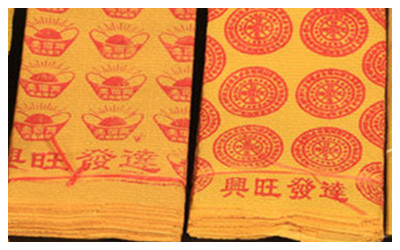
Joss Paper
 Joss paper is traditionally made from coarse bamboo paper, although rice paper is also commonly used. Known as ghost or spirit money, Joss Paper, are sheets of paper that are burned in traditional Chinese deity or ancestor worship ceremonies during special holidays. Joss paper is also burned in traditional Chinese funerals.
Joss paper is traditionally made from coarse bamboo paper, although rice paper is also commonly used. Known as ghost or spirit money, Joss Paper, are sheets of paper that are burned in traditional Chinese deity or ancestor worship ceremonies during special holidays. Joss paper is also burned in traditional Chinese funerals.
History of Joss Paper
From the song Dynasty (960-1279 ) on, Joss Paper was known primarily aspaper horse. The emergence of paper joss was closely connected with totems in ancient China. According to historical records, most people in ancient China used to wear and hang up paper charms to celebrate festivals. For instance, on the first five days of lunar May, people put up the "Five- thunder Amulet" and wore small paper charms. On the fifteenth day of lunar August, they offered sacrifices to the moon. in the meantime, the print workshops put moonlight prints on the market for sale. They featured a full moon with a Buddha seated on a lotus base and, nearby, a little rabbit standing on its hind legs grinding medicinal herbs in a mortar. On the twenty-fourth day of lunar December, people used to feed fodder to the Kitchen God's horse, believing that the venerable god would ascend to heaven on it. And on the twenty- fifth, people burned joss-sticks to greet the jade Emperor, who would descend from heaven to inspect worldly affairs.
How to use?
Traditional joss paper is cut into individual squares or rectangles. Each square of paper has either a thin piece of square foil glued to its centre or it may be endorsed with a red ink seal from a traditional Chinese seal. The colour of the paper is white, white colour representing mourning, the square foil normally has a golden or silver metal shade and hence representing wealth or money, leading to the name ghost or spirit money. Another appearance form of joss paper is "gold paper", shaped like ingots or towers.
When burning the joss paper, the sheets are treated as real money: they are not casually tossed into the fire, but instead placed respectfully in a loose bundle. Alternatively in some customs, each joss paper sheet may be folded in a specific way before being tossed into the fire. This practice is an extension of the belief that burning real money brings bad luck.
The joss paper is folded in half, or folded into a shape of a gold ingot before being burned in an earthenware pot or a specially built chimney. Joss paper burning is usually the last performed act in Chinese deity or ancestor worship ceremonies and at funerals it is the last ceremony before the deceased is lowered into the ground. In Taoist rituals, the practice of burning joss paper to deities or ancestors is acceptable.
The spirit money are a modernisation of joss paper, an afterlife monetary paper offering used in traditional Chinese ancestor veneration. The use of spirit money (also known as hell money or heaven money) in different rituals is deeply rooted in Asian culture.







 Ask Questions ?
Ask Questions ?